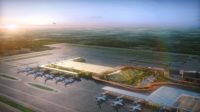As Atlanta Hartsfield-Jackson International Airport's $6-billion expansion program heads for a final landing in 2012, the airport is wrapping up other epic challenges, such resolving disputes with a design-firm joint venture and the airport's major airline tenant.
All major construction is just about complete, with some 900 workers on-site, ramped down from a peak of 2,000, says Kevin Fauvell, project construction manager with the $1.19-billion construction manager-at-risk contractor, a joint venture of Holder Construction Co., Manhattan Construction Group, CD Moody and Hunt Construction Group.
The original budget for the new Maynard H. Jackson International Terminal was $1.19 billion, with a contingency reserve fund of $168 million. “The budget is right on track, at right around $1.4 billion,” says Louis Miller, the airport's general manager. “The money is all in place. We did it with general bond financing in November 2010 to finalize all the money we needed to finish the terminal and to pay off some of the paper we had before.”
Crews excavated a total of some 144,000 cu yd of earth for a new tunnel 30 ft deep, employing the same conveyor-belt-system concept used for the airport's 9,000-ft-long fifth runway (ENR 6/02/03 p. 22). The 1,200-ft-long, 40-ft-wide tunnel will link the new terminal to Concourse E to the west, beneath a taxiway. The terminal's 12 gates plus six tunnels will funnel international travelers into two major points of entry to the Immigration and Naturalization Service hall, where they can choose from 21 processing counters.
The joint venture kept work moving even when the airport required the contractor's site office to be relocated to make way for parking. “We were thrown a curveball,” says Fauvell, who adds the move was beneficial in terms of site proximity.
Work now consists mainly of interior finishes—contractors avoided expensive finishes by using painted Sheetrock and wainscoting, says Fauvell—and testing of people-mover trains and baggage handling systems for the 1.2-million-sq-ft terminal, designed by Atlanta Gateway Designers, a joint venture of Atlanta-based Gresham, Smith & Partners and Duckett Design Group, East Point, Ga.
The city of Atlanta, which owns Hartsfield, settled with the original design-team joint venture led by Omaha-based Leo A Daly, which sued after termination of its $34-million contract over cost concerns. The city agreed to pay the joint venture approximately $1 million for its work and now refers to the termination label as one of convenience. The joint venture's insurance company will pay the airport $10 million, and all agreed to drop the lawsuits.
The airport also patched things up with Delta Air Lines, which now is willing to invest $2 billion through 2013 in airport facilities, including some of the $1.4 billion cost of the new international terminal.
The dispute occurred after the airline balked at the cost of the new terminal and Delta and the airport entered into tough negotiations over a new lease. The talks turned sour when the news broke that the then-general manager, Ben DeCosta, secretly had recorded the negotiations.
“While there have been hurt feelings along the way, we have a fantastic world-class asset in Hartsfield-Jackson that will allow Delta to grow without breaking the bank,” says Holden Shannon, a Delta senior vice president.
Signed in September 2010 with all of Hartsfield-Jackson's airline tenants, the new lease includes a supplemental rental payment of $30 million to help fund the new international terminal. Much of the credit for the fresh start goes to Miller, who made repairing the relationship with Delta a priority after he replaced DeCosta in September 2010.
“One of the good things that came out of those new lease agreements is we have preferential, rather than exclusive, gates,” says Miller. “We have common-use facilities, so we can have opportunities for people to expand their operations here.”
Delta and the city of Atlanta share a vested interest in the Hartsfield-Jackson airport maintaining its role as one of the world's premier hubs. The airport has a direct impact of $32.5 billion on the region's economy, much of which comes from the 27,000 Delta employees based at the facility.

